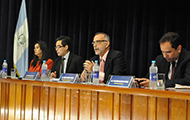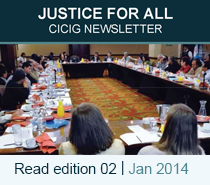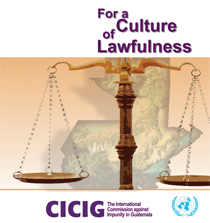 Guatemala, August 1, 2011. The stability of the tenure of judges, the strengthening of the career system in the Judiciary, the creation of the Council of Judges and the separation of administrative roles from judicial roles are the main constitutional amendments proposed by the International Commission against Impunity in Guatemala (CICIG) to achieve a genuinely independent justice system.
Guatemala, August 1, 2011. The stability of the tenure of judges, the strengthening of the career system in the Judiciary, the creation of the Council of Judges and the separation of administrative roles from judicial roles are the main constitutional amendments proposed by the International Commission against Impunity in Guatemala (CICIG) to achieve a genuinely independent justice system.
The Commission considers the independence and impartialness of a judge to be individual rights stemming from the right for citizens to be tried by a competent, impartial judge, as established in the International Covenant on Civil and Political Rights and the American Convention on Human Rights.
Therefore, CICIG believes that judicial independence must be guaranteed in accordance with international human rights standards and the constitution. The Commission also believes that the Constitution of the Republic includes a number of provisions that fail to contribute to judicial independence as defined by international standards, namely the provisions concerning the procedure to appoint officials to the Supreme Court of Justice, the Court of Appeals and other courts of a similar standing, as well as those on the career system in the Judiciary and the tenure of judges.
As to the career system in the Judiciary, CICIG believes judges should have the right to be promoted, even as high as the Supreme Court of Justice, based on their professional merits. This concept seeks to create a genuine career system where judges are able to rise through the ranks to occupy the highest positions. It would also serve as motivation to improve professional performance.
Moreover, the current system sets out five years of judicial service. This contravenes the principle of the irremovability of judges, which is based on the right to independence and impartialness embodied in the American Convention on Human Rights. Judges should only be dismissed if they have committed an offence that constitutes legal grounds for dismissal. This reform aims to enable judges to work free of pressure or fears relating to the nearing end of their constitutional tenure—all of which place constraints upon the actions of a judge.
Furthermore, the career system in the Judiciary should bolster the ethics, the judicial integrity and the institutionalization of a meritocracy for judges, including an appropriate discipline system and the enforcement of the relevant punishments. It is also necessary to strengthen the Council of Judges, so as to provide transparency guarantees in the procedures to evaluate, appoint and dismiss judges of the Judiciary (OJ) in Guatemala.
Finally, CICIG believes the constitutional reform of the Judiciary (OJ) should create the bases of a system to appoint and assess judges in a transparent, objective and reliable manner. Furthermore, the merits, knowledge, experience and competence of the officials must be key factors in determining their appointment, retention and promotion.



 Guatemala, August 1, 2011. The stability of the tenure of judges, the strengthening of the career system in the Judiciary, the creation of the Council of Judges and the separation of administrative roles from judicial roles are the main constitutional amendments proposed by the International Commission against Impunity in Guatemala (CICIG) to achieve a genuinely independent justice system.
Guatemala, August 1, 2011. The stability of the tenure of judges, the strengthening of the career system in the Judiciary, the creation of the Council of Judges and the separation of administrative roles from judicial roles are the main constitutional amendments proposed by the International Commission against Impunity in Guatemala (CICIG) to achieve a genuinely independent justice system.












